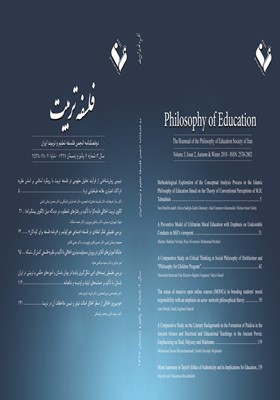جایگاه آموزشهای آنلاین در پرورش مسئولیتپذیری اخلاقی با تأکید بر نظریه فلسفی کنشگر-شبکه
محورهای موضوعی :امیر مرادی 1 * , سعید ضرغامی 2
1 - 0
2 - دانشگاه خوارزمی
کلید واژه: دوره برخط آزاد انبوه (موک), مسئولیتپذیری اخلاقی, نظریه کنشگر-شبکه, آموزش عالی,
چکیده مقاله :
هدف پژوهش حاضر، بررسی جایگاه موکها در پرورش مسئولیتپذیری اخلاقی با تأکید بر نظریه کنشگر-شبکه است. پژوهش حاضر فلسفی و روش آن از نوع تحلیل مفهومی و زبانی و تحلیل منطقی فرارونده است. اسناد تحلیلشده شامل دیدگاههای صاحبنظران، کتب، پیشینه مطالعاتی و پژوهشهای مرتبط در این زمینهاند. پژوهش نشان داد که بربنیاد نظریه کنشگر–شبکه و عاملیت همزمان انسان و فناوری و تأثیرگذاری متقابل آنها بر یکدیگر، موکها ابزاری خنثی نیستند و میتوانند دارای جایگاه دوگانه سازنده و غیرسازنده در پرورش مسئولیتپذیری اخلاقی باشند. از یکسو از طریق تغییر نقش استاد و فراگیر، بهکارگیری رویکردهای تعاملی در تدریس، پرورش شایستگیهای اختصاصی و توسعه عدالت آموزشی زمینه پرورش مسئولیتپذیری اخلاقی را فراهم میکنند، از سوی دیگر، بهعلت غیرحضوری بودن، پذیرش بیقیدوشرط همه متقاضیان، شلوغ بودن کلاسها، وجود هویتهای کاذب و امکان ناشناختگی فراگیران، باعث کاهش مسئولیتپذیری میشوند. بر اساس نظریه کنشگر-شبکه و نگاه واسطهای، متقارن و شبکهای به انسان و مصنوعات میتوان چنین نتیجهگیری کرد که موکها از طریق تغییر ماهیت علایق و قصدهای کنشگران، زمینه پرورش مسئولیتپذیری یا مسئولیتگریزی اخلاقی آنها را فراهم کردهاند. این ابزار بهخودیخود فاقد ابزاری برای تقویت مسئولیتپذیری اخلاقی است اما این خلاء را میتوان با تعاملیتر کردن محیط یادگیری و استفاده بیشتر از فناوریهای چندرسانهای پر کرد.
The goal of this research is investigate the position of MOOCs in breeding students' moral responsibility with an emphasis on actor- network theory. The present research is philosophical and conceptual and linguistic analysis and transgressive logical analysis. Documents analyzed included views of experts, books, background studies and related research in the field. Findings of the research showed; based on the theory of actor- network and the simultaneous function of man and technology and their interactions between each other, MOOCs is not a neutral tool and can has a dual position is constructive and unconstructive in breeding students' moral responsibility. On the one hand, through changing the role of the teacher and the student, the application of interactive approaches in teaching, the development of specific competencies and the development of educational justice have provided a basis for breeding responsibility. On the contrary, due to the non-presence, unconditional acceptance of all applicants, crowded classrooms, the existence of false identities and the possibility of unknowing learners have reduced student responsibility. Based on the theory of actor network and the intermediate, symmetric and network look at humans and artifacts, it can be concluded the technology of MOOCs through changing the nature, interests and intentions of the actors provides background for training their moral responsibility or irresponsible. But this lackage can be filled by interacting with the learning environment and using more than multimedia technologies.

